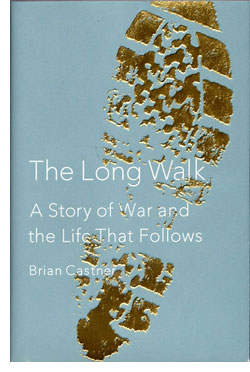 |
 Brian Castner
Brian Castner
The Long Walk: A Story of War and the Life That Follows
Doubleday / Random House
US Hardcover First Edition
ISBN 978-0-385-53620-2
Publication Date: 07-10-2012
224 Pages; $25.95
Date Reviewed: 08-18-2012
Reviewed by: Rick Kleffel © 2012
Index:
Non-Fiction
Brian Castner tells us that he is capital-C Crazy. He is home from the war, running. Then he is in Kirkuk; then home, in bed; then in Hawija. The fragments speed by us, jagged edges of prose torn from a life. Restless, fatigued beyond redemption, terrified, confident; Castner is all of them at once, and none of them. He is telling us a story, the story, his story, all the stories are colliding in front of us as we turn the pages. Lives merge and emerge, emotions shatter. 'The Long Walk' is a short, literally explosive reading experience.
Castner was a college graduate with an engineering degree who liked the challenge of the EOD (Explosive Ordnance Disposal) teams in the Air Force. The washout rate was high, and in 1999, when his foot went into the door, it looked like a good gig. He was in Saudi Arabia in August of 2001. Afterwards, things grew dangerous.
Make no mistake; 'The Long Walk' is an intense and powerful work of non-fiction that reads very much like a novel. This is because Castner made the smart decision to structure his book as if someone had set off an IED in the midst of the chronological narrative, and in fact, that's pretty much what he does. The resulting narrative fragmentation is anything but random. When Castner puts the pieces of his life back together, he does so with an artfulness that finds order in the chaos and meaning in the seemingly arbitrary events that are juxtaposed in the story. Our reading experience maps to his life experience, and we make the connections that he did. It's a smart but difficult path to pursue that Castner handles with ease.
Castner's story is full of shades of grey; he makes it through the intense training, gets assigned to a detail, but then, in an understandable effort to deal with the bureaucracy that has been built to protect the soldiers but can hinder effectively fighting the war, he makes a decision that gets him sidelined. His memory of the worst parts of war is perfect; his memory of the best parts of his life at home is fragmented. He knows that he is capital-C Crazy but finds ways to deal with it. There's a gritty, intense sensibility at work here that makes this book almost impossible to put down.
For all that the book is about how war blows stuff up, including straightforward chronological narrative, 'The Long Walk' is very well plotted and constructed. Castner takes us from gritty scenes of war to thoughtful consideration of war theory to the trauma of notifying families of the dead and the new neuroscience of Tramatic Brain Injury, TBI, that seeks to explain what is happening. There is resolution, of a sort, and as readers we drive towards that, are compelled to read to the final word. 'The Long Walk' is an immersive, engaging vision of what happens to the men we send to war, at war and at home. Castner's shattered memories will merge with yours, his perceptions will alter yours. Reality is not so continuous as we'd like to think and chronological events need not be experienced contiguously. We all edit our memories and our stories; Castner's version of his life will ultimately inform our own.
|
 |




